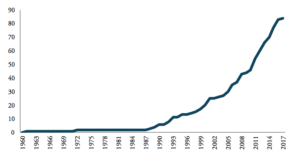How the EU’s New Trade Provision Could End Up Justifying More Data Localisation Globally
The EU is about to decide how to push back against forced data localisation measures that European firms are increasingly facing when doing business abroad. Unfortunately, its proposed trade provision risks justifying more data localisation measures around the world — unless national trade ministers demand more ambition.
Cumulative number of restrictions on cross-border data flows (1960-2017)
European exports and jobs are increasingly harmed by the rise of forced data localisation measures around the world (see figure above). As the world’s main exporter of manufactured goods and services, and as an emerging leader in connected cars and the Internet of Things, Europe’s economy increasingly relies on the ability to move data across borders. Interestingly, the EU has strong data protection laws that have coexisted with its trade commitments on data flows for decades. The EU could seek to ensure commercial data flows while promoting its high data protection standards globally.
The risk, as recently highlighted by the European Parliament, is that third countries will justify data localisation measures for data protection reasons. Unfortunately the European Commission’s proposed text will encourage exactly that. Its article B2 states that “Each Party may adopt and maintain the safeguards it deems appropriate to ensure the protection of personal data and privacy.” This is essentially a carte blanche for non-EU countries to introduce data protectionism under the guise of “data protection”. It doesn’t even require that countries can demonstrate that such laws are necessary and done in the least trade restrictive way, as under existing international trade law, which the EU has long been a party to.
On May 22 the 28 European trade ministers are expected to meet and decide on their position. Hopefully they will demand a much more ambitious trade provision on data flows. It is not too late for the EU to lead the charge against data protectionism while promoting data protection globally.









